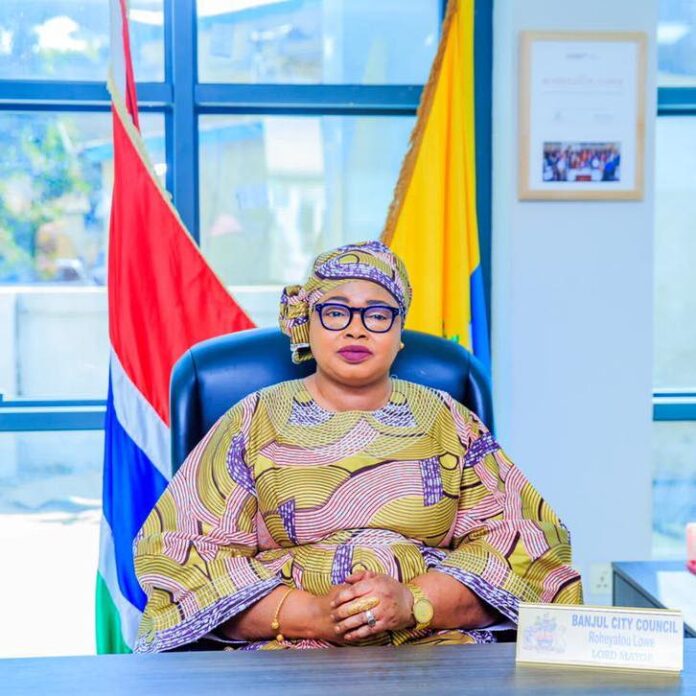By: Alieu Jallow
The United Democratic Party (UDP), the country’s leading opposition force, is facing fresh internal tensions following a series of public comments by some of its most prominent mayors and supporters. The rift comes in the wake of a leaked audio recording in which party leader Ousainou Darboe allegedly acknowledged the UDP’s internal division into three camps: his own, that of Talib Bensouda, and another aligned with Yankuba Darboe.
Mayor Rohey Malick Lowe of Banjul, in a blistering appearance on Eye Africa TV, rejected claims that she leads a separate camp.
“I do not have a camp; I belong to the Ousainou camp. If there’s any camp, then it’s Ousainou Darboe and Talib Bensouda who have camps—and I belong to Ousainou’s camp. If Ousainou Darboe divides his camp into two and then aligns one to Rohey Malick Lowe, then that’s up to him, for he knows that I do not belong to any camp,” she stated.
Lowe stressed that she is “allergic to camps,” adding, “I fight my battles alone.” The Banjul mayor also explained her decision to stop attending UDP executive meetings, pointing fingers at the party’s failure to condemn alleged defamatory remarks made by Mark Janneh against her.
She expressed deep frustration over what she sees as the executive’s silence on the issue, despite multiple press conferences and statements. “None of which condemned Mark Janneh’s derogatory remarks,” she said, adding that the party’s inaction almost cost her her marriage.
Meanwhile, Mayor Talib Bensouda of the Kanifing Municipal Council broke his silence to address rising tribal rhetoric within party ranks. Though previously quiet, Bensouda took to social media to deliver a firm rebuke of tribal politics, calling on all UDP factions to unite for the greater good.
“I hate discussing tribal politics or tribal talks, so I’m talking to all UDP members—pro-Talib, UDP supporters, pro-Ousainou supporters—we are all one family. Whoever we are, let’s try and talk about the advancement of our party policy or party manifesto. How do we win 2026? How do we develop The Gambia?”
He called on Gambians to put an end to tribal narratives.
“Please, Gambians, let us seize and stop talking about tribe. Support people through their character, support their development and track records. Never discuss tribe. This conversation must stop—it has destroyed this country and brought a lot of problems.”
Shifting focus, Bensouda highlighted the country’s worsening economic situation, citing a national cement shortage and the rising cost of living as issues deserving attention from all opposition leaders.
“Right now, things are very difficult for Gambians across the board. Cement is D500, and it’s not even available—a big shortage. This is what the opposition should be talking about. How do we allow a whole country like The Gambia to have a cement shortage? The cost of living is rising—bags of rice and other basic commodities are getting harder to afford, especially for poor people. This is what we have to discuss.”
Namana Keita, a staunch UDP supporter and former journalist, added another layer to the conversation through a Facebook post, warning against relying on ethnic majoritarianism in a diverse electoral landscape.
“With Mandinkas making up just 34.4% of the population—at least 10% of whom support Barrow and the NPP—and Fulas at a significant 25%, along with Wolofs at 15.4%, in a country that practices a simple majority voting system, only a fool would believe that an exclusive Mandinka-based group—especially one that openly shows its distrust of others—can ever win a presidential election in The Gambia. You will never stand a chance.”
Keita described what he sees as the party’s “Talib dilemma,” warning that bypassing Bensouda for Yankuba Darboe could backfire at the polls.
“Any attempt to leapfrog Yanks over Talib would be widely perceived and resoundingly countered at the polls as a Mandinka ‘fassa,’ especially when it was Talib who first proved his political mettle before Yanks.”
Keita argued that the UDP has a clear path to victory in 2026 by nominating Bensouda, aligning with a credible party like the GDC, and enforcing term limits.
“By the time term-limited Talib has completed his second term, Yanks will only be in his early 50s and well-positioned, seasoned, and ready to take the baton. With the advantage of incumbency and a growing base of educated and energetic youth, UDP could realistically govern The Gambia for the next 100 years.”
Ismaila Fadera, a young UDP leader, chimed in with a call for internal discipline and purpose-driven organizing.
“You want reform? Organize. Mobilize. Stand for something beyond posts and tantrums. What we won’t tolerate is this new brand of political indiscipline masked as ‘outspokenness.’ There’s a difference between holding leadership accountable and publicly disrespecting the very house that made you relevant.”
As the 2026 elections approach, the growing public rift within the UDP raises questions about the party’s unity and its ability to present a strong challenge to the ruling National People’s Party (NPP). Whether the party can reconcile its internal divisions or allow them to fester remains to be seen.




